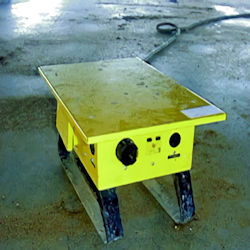Ground Fault Circuit Interrupters (GFCI)
The ground-fault circuit interrupter (GFCI) is a fast-acting circuit breaker designed to shut off electric power in the event of a ground-fault within as little as 1/40 of a second.

It works by comparing the amount of current going to and returning from equipment along the circuit conductors. When the amount going differs from the amount returning by approximately 5 milliamperes, the GFCI interrupts the current.
- All 125-volt, single-phase, 15-, 20-, and 30-ampere receptacles on construction sites that are for temporary power and are available for use by employees, must have approved ground-fault circuit interrupters (GFCIs).
- GFCI protection must be located at the outlet end of the circuit. Extension cords or other devices with listed ground-fault circuit interrupter protection are acceptable.
- Receptacles more than 125-volt, single phase, 30-amperes must have protection that complies with GFCI protection above, or an assured equipment grounding conductor program.
Knowledge Check Choose the best answer for the question.
4-5. Ground fault circuit interruption (GFCI) protection on construction sites must be located at the _____ of the circuit.
You forgot to answer the question!
